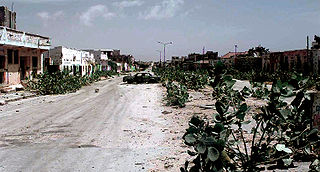
The Somali Armed Forces are the military forces of the Federal Republic of Somalia. Headed by the president as commander-in-chief, they are constitutionally mandated to ensure the nation's sovereignty, independence and territorial integrity.

The Somali Civil War is an ongoing civil war that is taking place in Somalia. It grew out of resistance to the military junta which was led by Siad Barre during the 1980s. From 1988 to 1990, the Somali Armed Forces began engaging in combat against various armed rebel groups, including the Somali Salvation Democratic Front in the northeast, the Somali National Movement in the Somaliland War of Independence in the northwest, and the United Somali Congress in the south. The clan-based armed opposition groups overthrew the Barre government in 1991.
An arms embargo is a restriction or a set of sanctions that applies either solely to weaponry or also to "dual-use technology." An arms embargo may serve one or more purposes:

The African Union Mission in Somalia (AMISOM) was a Multinational force formed by the African Union. The operation deployed to Somalia soon after the Islamic Courts Union was deposed by troops from Ethiopia during a large scale invasion in late 2006. The missions primary objective was to maintain the regime change between the ICU and the newly installed Transitional Federal Government, implement a national security plan and train the TFG security forces. As part of its duties, AMISOM later supported the Federal Government of Somalia in its war against Al-Shabaab. AMISOM was the most deadly peacekeeping operation in the post-war era.
Various international and local diplomatic and humanitarian efforts in the Somali Civil War have been in effect since the conflict first began in the early 1990s. The latter include diplomatic initiatives put together by the African Union, the Arab League and the European Union, as well as humanitarian efforts led by the Office for the Coordination of Humanitarian Affairs (OCHA), UNICEF, the World Food Programme (WFP), the Puntland Maritime Police Force (PMPF) and the Somali Red Crescent Society (SRCS).

Somalia–United States relations are bilateral relations between the Federal Republic of Somalia and the United States of America. Somalia has an embassy in Washington, D.C., and the United States maintains an embassy in Mogadishu which was reopened in late 2019.

The Somali Civil War (2009–present) is the ongoing phase of the Somali Civil War which is concentrated in southern and central Somalia. It began in late January 2009 with the present conflict mainly between the forces of the Federal Government of Somalia assisted by African Union peacekeeping troops and al-Shabaab militants who pledged allegiance to al-Qaeda during 2012.

United Nations Security Council Resolution 1863, adopted unanimously on January 16, 2009, after recalling resolutions 733 (1992), 751 (1992), 1356 (2001), 1425 (2002), 1519 (2003), 1725 (2006), 1744 (2007), 1772 (2007), 1801 (2008), 1811 (2008), 1814 (2008), 1831 (2008) and 1844 (2008) on the situation in Somalia, the Council its intention to establish a peace-keeping force in war-torn Somalia and called on Secretary-General Ban Ki-moon to develop, by April 15, 2009, a mandate for the proposed mission, which would replace the existing African Union force in the country (AMISOM).
The United Nations Support Office for AMISOM (UNSOA) was a field support operation led by the United Nations Department of Field Support (DFS). It was located in Mogadishu and Nairobi in East Africa, focused on support of the African Union Mission in Somalia (AMISOM).

United Nations Security Council Resolution 1916, adopted unanimously on March 19, 2010, after recalling resolutions 733 (1992), 1519 (2003), 1558 (2004), 1587 (2004), 1630 (2005), 1676 (2006), 1724 (2006), 1744 (2007), 1766 (2007), 1772 (2007), 1801 (2008), 1811 (2008), 1844 (2008), 1853 (2008), 1862 (2009), 1894 (2009) and 1907 (2009), the Council extended the term of the Monitoring Group for 12 months and expanded its mandate to include the monitoring of the arms embargo on Eritrea in addition to Somalia.

United Nations Security Council Resolution 1724, adopted unanimously on November 29, 2006, after recalling previous resolutions on the situation in Somalia, particularly resolutions 733 (1992), 1519 (2003), 1558 (2004), 1587 (2005), 1630 (2006) and 1676 (2006), the Council re-established a group to monitor the arms embargo against the country for a further six months and condemned an increase in the flow of weapons to the country.

United Nations Security Council Resolution 1801 was unanimously adopted on 20 February 2008.

United Nations Security Council Resolution 1814 was unanimously adopted on 15 May 2008. The resolution called for the United Nations to provide economic, political and technical support to Somalia, with a possible UN peacekeeping force.

The Puntland Maritime Police Force (PMPF) is a security force based in Puntland, an autonomous region in northeastern Somalia. As of May 2024, the PMPF had around 4800 personnel. The force is eventually expected to comprise 10,000 personnel.

Hassan Sheikh Mohamud is a Somali politician serving as the current president of Somalia since 15 May 2022. He previously held the office from 2012 to 2017.
On 14 August 2006, Galmudug declared autonomy in central Somalia.
The Political history of Somalia covers the development of the Somali government and institutional systems following the collapse of the Siad Barre regime in 1991.
Hassan Sheikh Mohamud's tenure as the 8th President of Somalia began with his inauguration on 16 September, 2012 and ended on 16 February, 2017.
Division "12 April" is a division/area command of the Somali National Army. It was established in 2014, supervising Somali troops in the areas of AMISOM Sectors 1 and 5 around Mogadishu.











